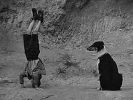Eye For Film >> Movies >> Long Live The Republic (1965) Film Review
Long Live The Republic
Reviewed by: Rebecca Naughten

A beautiful and visually distinctive film, Long Live The Republic! (At’ Zije Republika!) utilises the point-of-view of a child - Oldrich (Zdenek Lstiburek) - who doesn’t understand the implications of events unfolding around him, in order to offer a clear-eyed and markedly unidealised perspective on the murky moralities of war and the mendacity of adults. Most of the film takes place on the day and night in which Oldrich's life intersects with both the Nazis retreating from an occupied village and the arriving Russian liberators.
This is a violent childhood, not simply because it takes place in a time of war but because of the bullying Oldrich undergoes at the hands of other boys - stripped naked and left tied to a tree in one sequence - and the brutality his father (Vlado Müller) regularly subjects him to. The only kindnesses shown to him come from his mother (Nadezda Gajerová) - who Oldrich often imagines as a saint - and a local man, Cyril (Gustáv Valach), with whom he shares a love of dogs.

At the centre of the film is Lstiburek’s unwavering gaze. By turns impertinent and impish, the small boy - nicknamed ‘midget’ by his tormentors - is depicted as a constant observer, always watching even if he doesn’t always understand what he’s seeing. He is frequently framed so that only the top half of his head is in the shot, usually the bottom right corner, his eyes visible just above the edge of the screen - he is the filter through which we are seeing events. Likewise, the camera often mimics or draws attention to Oldrich's diminutive stature, either by tilting up to look at adults and tall structures or conversely observing him from a high angle.
Oldrich's imagination buffers his experience of the brutality around him, and by aligning with his perspective, the film takes on the feel of a stream-of-consciousness narrative - what the boy encounters is intercut with his memories and fantasies, which increasingly overwhelm him as his need to escape from reality becomes paramount. Some of these are subconscious links - such as a montage of Oldrich's mother repeatedly calling him home with the lie that his father is asleep and won't beat him tonight blending with a situation where Oldrich is being misled and violence is imminent - enlightening the viewer, if not the boy. In the later stages of the film, the editing (by Miroslav Hájek, who also worked on key Czech New Wave films by V?ra Chytilová and Miloš Forman) deliberately blurs the lines between reality, memory, and fantasy to the extent that it is sometimes difficult to tell them apart.
While reality is often exhilarating - for example, a horse and cart chase sequence through the fields and forest - the blurring of memory and fantasy conjures up images of great beauty, as seen in Oldrich's escape onto a passing ice floe. The ice floe sequence encapsulates many of the film's distinctive elements - not least the way that brutal violence, a recurring motif in the boy's life, is juxtaposed with Lsitburek's engaging performance, as seen here in his jerky, marionette-like victory dance on the ice, with the droll and delighted triumph in the roll of his eyes indicating the darkly ironic humour that runs through the film.
Similarly, the beautiful black and white widescreen cinematography - amazingly this was DoP Jaromír Sofr's first professional engagement - is undercut by the 'punchline' of the camera pulling back in the next shot to show Oldrich further downstream, stranded in the centre of the river, before cutting to a close-up of the dawning realisation of disaster on the boy's face. It isn't clear whether the sequence is a memory or partly fantasy, but reality always reappears.
With co-writer Jan Procházka, director Karel Kachy?a made several films set during key moments of Czech history, of which Long Live The Republic! was the first. Produced only 20 years after the end of the Second World War, it could be taken as an impudent riposte to prevailing national myths about the period. The film is shot through with dark humour, and in Oldrich's youthful incomprehension Kachy?a finds a way to critically depict the community's baser instincts without being overtly moralistic - although having the small boy witness Cyril's sad fate suggests that by the end of the film Oldrich's eyes have been opened to the iniquities of the adult world.
Long Live the Republic! is currently screening around the country (and on the BFI Player) as part of a season of the films connected to Mark Cousins' A Story of Children And Film - catch it while you can.
Reviewed on: 05 May 2014















